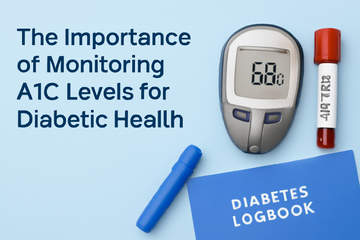The Importance of Monitoring A1C Levels for Diabetic Health

Managing diabetes involves more than just monitoring blood sugar levels—it also requires tracking your A1C, a critical indicator of long-term blood glucose control. If you have diabetes or are at risk of developing it, understanding the significance of A1C and how it affects your health is crucial. In this blog, we’ll explore why regular A1C testing is essential for diabetes management, its impact on your health, and how to keep your A1C levels in a healthy range.
What is A1C?
A1C, also known as the hemoglobin A1C or glycated hemoglobin, is a blood test that reflects your average blood glucose levels over the past two to three months. It provides a broader picture of how well your diabetes is being controlled, beyond the fluctuations in daily blood sugar levels. When blood sugar is high, glucose attaches to the hemoglobin in red blood cells, forming A1C. The higher your blood sugar, the higher your A1C will be.
Why Monitoring A1C is Essential for Diabetic Health
-
Long-Term Glucose Control
Unlike daily blood sugar tests, which show short-term fluctuations, the A1C test offers a comprehensive view of your blood sugar control over an extended period. This is particularly important for people with diabetes, as it helps to assess whether your current treatment plan is effectively keeping your blood sugar within target ranges. -
Prevention of Complications
Consistently high blood glucose levels can lead to serious long-term health complications, such as heart disease, kidney damage, nerve damage, and vision loss. By regularly monitoring your A1C levels, you can better assess whether your current diabetes management strategies are sufficient to prevent these complications. Keeping A1C levels within the recommended range is one of the most effective ways to reduce the risk of developing diabetes-related complications. -
Personalized Treatment Adjustments
Regular A1C testing allows healthcare providers to evaluate the effectiveness of your diabetes treatment plan. If your A1C is too high, it may indicate that your current approach isn’t working as well as it should, prompting the need for adjustments in your medication, diet, exercise routine, or other aspects of your care plan. -
Tracking Progress
Monitoring A1C levels regularly gives you and your healthcare provider the ability to track your progress over time. Achieving and maintaining a healthy A1C level indicates that your efforts to manage your diabetes are paying off. If your A1C is on target, it’s a sign that your lifestyle choices, such as diet, exercise, and medication adherence, are effectively managing your blood sugar.
What is a Healthy A1C Range?
For most people with diabetes, the target A1C level is generally below 7%. However, individual targets may vary depending on age, overall health, and other factors. For people without diabetes, a normal A1C level is below 5.7%.
-
Below 5.7%: Normal range for people without diabetes.
-
5.7% – 6.4%: Prediabetes; an elevated risk of developing type 2 diabetes.
-
6.5% or higher: Diagnosed with diabetes.
How to Keep Your A1C in Check
Maintaining a healthy A1C is a multi-faceted approach that involves consistent lifestyle choices and medical supervision. Here are some tips to help keep your A1C levels under control:
-
Eat a Balanced Diet
A diet rich in whole grains, lean proteins, vegetables, and healthy fats can help regulate blood sugar levels. Avoid processed foods and sugary snacks that can cause blood sugar spikes. -
Exercise Regularly
Physical activity helps lower blood sugar by improving insulin sensitivity. Aim for at least 30 minutes of moderate-intensity exercise most days of the week. -
Take Medications as Prescribed
Medications, including insulin or oral diabetes medications, are often necessary for managing blood sugar. Take your medications as prescribed and consult your doctor if you experience any issues with your treatment plan. -
Monitor Blood Sugar Regularly
Keep track of your blood sugar levels throughout the day, especially before and after meals. This can help you understand how certain foods or activities affect your glucose levels. -
Stay Hydrated and Get Enough Sleep
Drinking plenty of water and getting adequate sleep are often overlooked but can significantly impact blood sugar control. Dehydration and lack of sleep can cause blood sugar levels to rise.
Conclusion
Monitoring your A1C levels is a vital aspect of diabetes management. By regularly testing and staying informed about your A1C, you can take proactive steps to manage your blood sugar, reduce the risk of complications, and improve your overall health. Whether you have diabetes or are at risk, understanding the importance of A1C testing and maintaining a healthy range is essential for long-term well-being.
Visit a1cguard.com today to learn more about how we can help you track and manage your A1C levels effectively.







